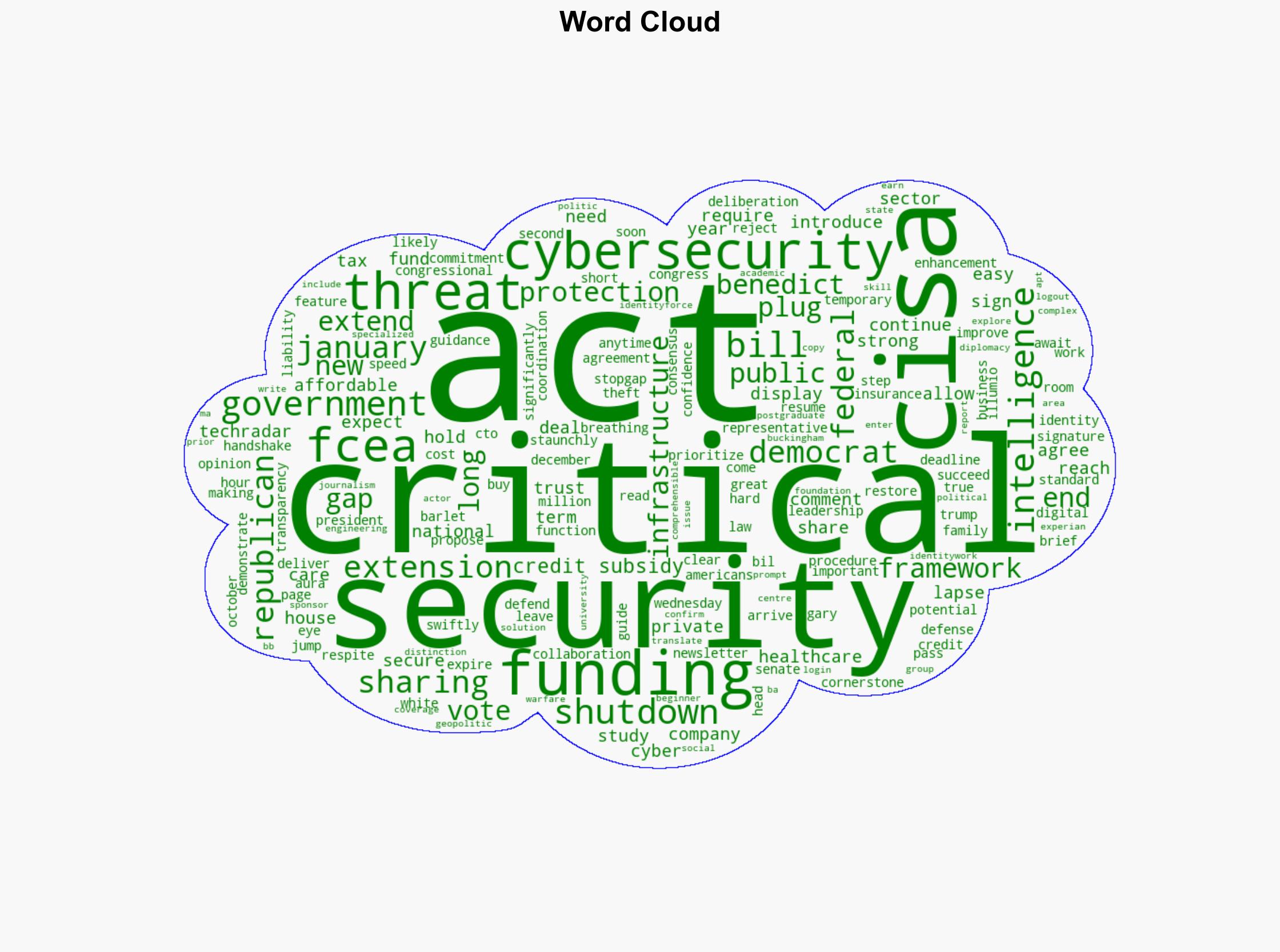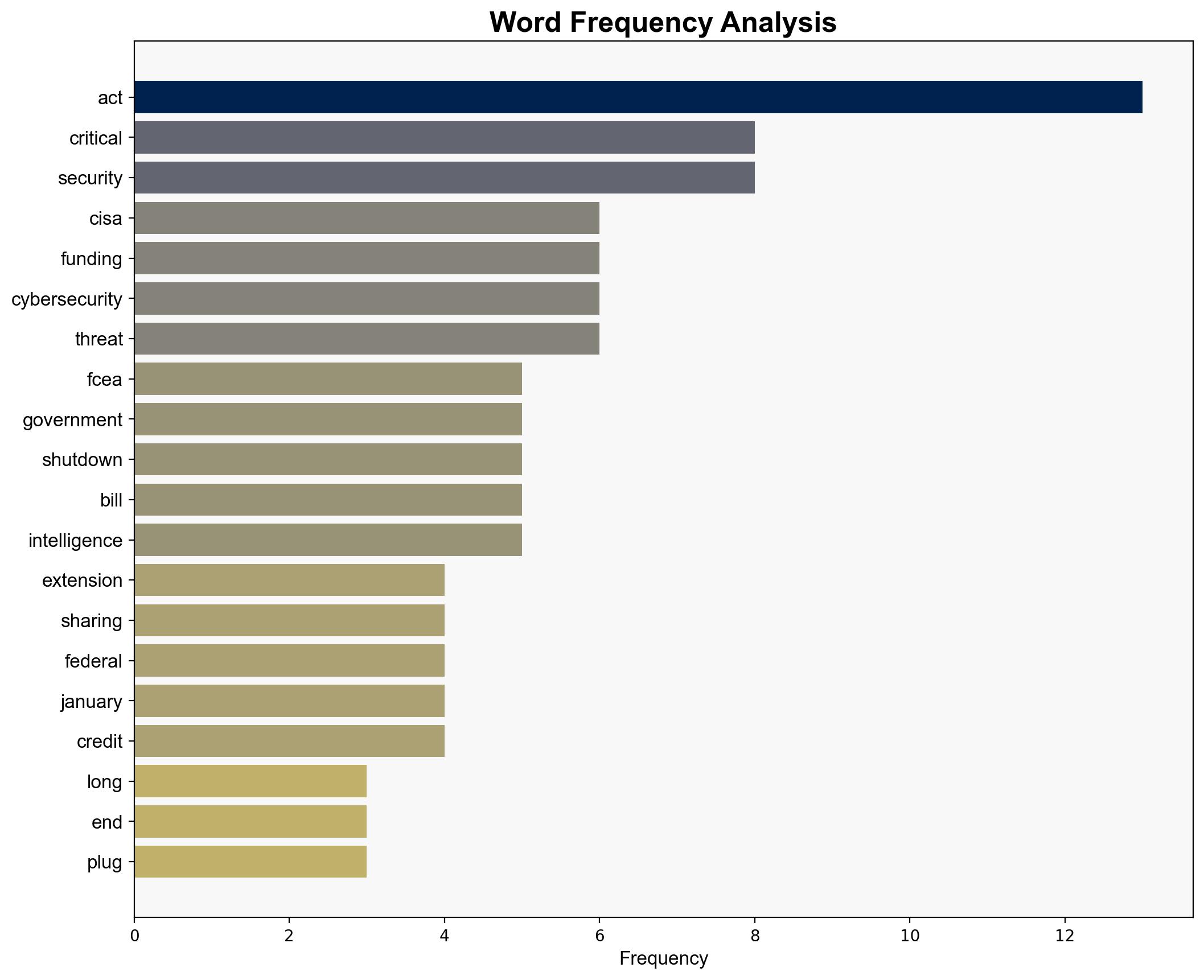Congressional stopgap deal secures critical CISA Act and FCEA funding amid longest ever US government shutdown but dont expect it to end anytime soon – TechRadar
Published on: 2025-11-11
AI-powered OSINT brief from verified open sources. Automated NLP signal extraction with human verification. See our Methodology and Why WorldWideWatchers.
Intelligence Report: Congressional stopgap deal secures critical CISA Act and FCEA funding amid longest ever US government shutdown but don’t expect it to end anytime soon – TechRadar
1. BLUF (Bottom Line Up Front)
The congressional stopgap funding deal temporarily secures the CISA Act and FCEA, crucial for U.S. cybersecurity, but the government shutdown is unlikely to end soon. The most supported hypothesis is that the shutdown will persist due to unresolved partisan disagreements, posing risks to national security. Confidence Level: Moderate. Recommended action: Prioritize bipartisan negotiation strategies to ensure long-term funding and prevent cybersecurity vulnerabilities.
2. Competing Hypotheses
Hypothesis 1: The stopgap funding will lead to a resolution of the government shutdown by January, as it provides a temporary reprieve and time for negotiation.
Hypothesis 2: The government shutdown will continue past January due to entrenched partisan divisions, particularly over healthcare subsidies, leading to further funding lapses and cybersecurity risks.
Hypothesis 2 is more likely due to the historical difficulty in resolving such deep-seated partisan issues, especially with significant policy disagreements like healthcare subsidies.
3. Key Assumptions and Red Flags
Assumptions: Bipartisan cooperation is essential for a long-term resolution; cybersecurity funding is a priority for both parties.
Red Flags: Persistent partisan rhetoric and lack of compromise on healthcare subsidies; potential for political maneuvering to delay resolution.
Deception Indicators: Public statements from political leaders may not reflect genuine negotiation progress.
4. Implications and Strategic Risks
The ongoing shutdown poses significant risks to national security by potentially disrupting critical cybersecurity operations. If the shutdown continues, it could lead to vulnerabilities in critical infrastructure protection and increased susceptibility to cyber threats. Economically, prolonged shutdowns can impact federal employees and contractors, leading to broader economic repercussions.
5. Recommendations and Outlook
- Actionable Steps: Encourage bipartisan dialogue focused on mutual interests in national security. Consider temporary concessions on contentious issues to facilitate negotiations.
- Best Scenario: A comprehensive funding agreement is reached by January, ensuring uninterrupted cybersecurity operations and ending the shutdown.
- Worst Scenario: The shutdown extends beyond January, leading to significant cybersecurity gaps and economic strain.
- Most-likely Scenario: Partial agreements are reached, extending the shutdown but maintaining critical cybersecurity funding.
6. Key Individuals and Entities
Gary Barlet: Public Sector CTO at Illumio, emphasizes the importance of the CISA Act for national security.
President Trump: His decision on signing the bill will influence the shutdown’s trajectory.
7. Thematic Tags
National Security Threats, Cybersecurity, Government Shutdown, Bipartisan Negotiation
Structured Analytic Techniques Applied
- Cognitive Bias Stress Test: Expose and correct potential biases in assessments through red-teaming and structured challenge.
- Bayesian Scenario Modeling: Use probabilistic forecasting for conflict trajectories or escalation likelihood.
- Network Influence Mapping: Map relationships between state and non-state actors for impact estimation.
Explore more:
National Security Threats Briefs ·
Daily Summary ·
Methodology





